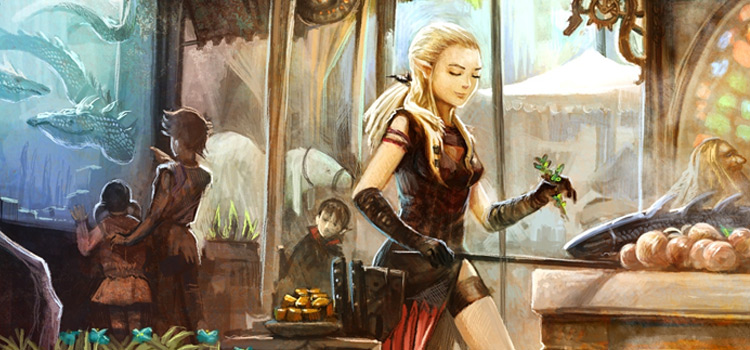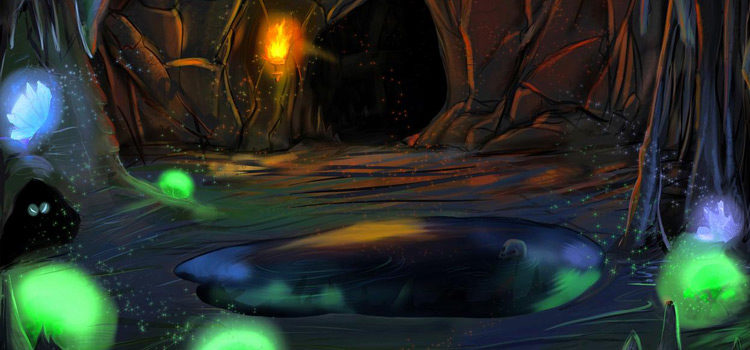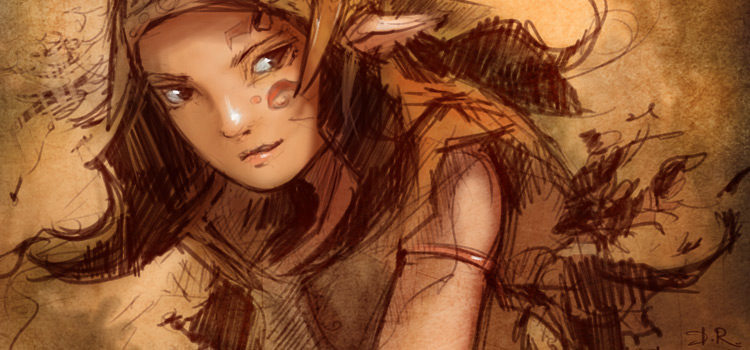Prestidigitation: D&D 5e Spell Guide, Uses & Ideas
This post may contain affiliate links. If you buy something we may get a small commission at no extra cost to you. (Learn more).
Prestidigitation is one of those roleplay-focused spells that can be divided into the things it definitely lets you do, and the things you can probably do with it.
It’s extremely flexible.
While it definitely has a place in non-combat moments during games, it has more than a few combat applications as well.
Prestidigitation
School: Transmutation
Level: Cantrip
Casting Time: One action
Range/Area: 10 feet
Components: V, S
Duration: Up to 1 hour
Prestidigitation allows you to create minor magical effects and tricks, similar to the stage magic of real-world magicians.
With the spell you can do any of the following. If you cast the spell repeatedly, you can have up to three of the non-instantaneous effects going at one time.
- Make harmless effects like sparks, or wind
- Light or extinguish candles, torches, and campfires
- Clean or soil a small object
- Warm, cool, or flavor nonliving substances
- Add colors, marks, or symbols to objects and surfaces
- Create a small nonmagical object (like a coin or a flower you pull from behind someone’s ear). It vanishes at the end of your next turn.
Who Gets Prestidigitation?
Pretty much everyone. Seriously.
As a cantrip, it’s easily accessible.
Prestidigitation is on the spell lists for the Artificer, Bard, Sorcerer, Warlock, and Wizard. Arcana Domain Clerics, Arcane Archers, Eldritch Knights, and Arcane Tricksters can get it as well, since it’s on the Wizard list.
High elves can choose it as their one wizard cantrip, as can half-elves with the High Half-Elf variant feature.
Eberron’s halfings with the Mark of Hospitality also get prestidigitation as part of their Innkeeper’s Magic feature.
Anyone can pick it up through the Magic Initiate feat, which grants 2 cantrips and a once-per-day 1st level spell.
Finally, multiclassing is a great way to get ahold of a few extra cantrips. If you happen to multiclass into any of the classes that get this spell, you can pick it up then.
Prestidigitation Uses, Tips & Tricks
Let’s take a look at some common and creative tips on how you can use this spell in your next campaign.
Sensory Effect
This use of prestidigitation lets you make a variety of odd effects.
The spell lists a few things you could use in stage magic, but where else could this be useful?
Well, the odd odor example could be extremely embarrassing for a noble. Assuming you can hide while casting the spell, there’s nothing to stop you from making a rival smell like manure.
There’s plenty of uses for this spell, so long as you can hide the fact that you’re casting it:
- Play ephemeral musical notes to make someone think a place is haunted
- Create foul odors to make someone leave a room, or think something is rotten
- Make a room smell like smoke, so a crowd evacuates a building
- Make someone feel like an arrow just passed by their cheek
- Make guards feel like they’ve been doused in magical itching powder
- Mimic the sound of footsteps or a signal bell
The spell lists a shower of sparks, but what about a puff of smoke?
Smoke is used in some old stage magician acts, and could be helpful in a quick getaway if your DM is willing to let you do that as a “harmless sensory effect.”
Light or Snuff
This is either relatively limited or extremely versatile, depending on your DM. This feature lets you light or extinguish a candle, torch, or small campfire.
This basically means you don’t need flint or any kind of fire-starter.
It can also be useful in combat. If your party has darkvision and your enemies don’t, a quick cast of prestidigitation might be all you need to plunge the room into darkness.
If you need light, on the other hand, you’re always ready to light your torch back up.
Where it gets tricky is whether candles, torches, and campfires are examples or a specific list. Unlike the sensory effect feature, it doesn’t say ‘such as.’
For example, what about a lantern? Lanterns aren’t explicitly listed in the spell, but many old lanterns were effectively candle-holders. Would you be able to extinguish a lantern with a candle but not an oil-burning lantern?
If your DM treats them as examples, you can use this basically to set any kind of small fire. For example:
- Lighting fuses for explosives
- Setting fire to oil traps
- Igniting lines or barrels of gunpowder
If you happen to have a DM who is very particular that the cantrip only lets you light the three things mentioned in the spell’s text, you’re still not out of luck. Just incorporate a candle or torch into your device.
If a DM refuses to let you light a fuse for a stick of dynamite with prestidigitation, tie or connect the fuse to a candle wick. You light the candle, the candle lights the fuse.
Your real limit is the kind of Rube Goldberg ridiculousness you can come up with.
This does cross into the same territory as spells like produce flame and fire bolt, so if someone else in the party has one of those spells, it might be better to leave the fire-starting to them.
Clean or Soil
You can get a lot of use from this feature, especially if you happen to be playing in a campaign based around intrigue.
Adventuring in D&D… generally leads to a decent amount of killing. It doesn’t have to, but you never know when dealing with a tyrannical lord or a demon cult will end up leaving a bit of a mess.
Fortunately, you have the fictional magic paper-towel you need to wipe up all those unseemly messes. Blood, dirt, sweat, other unspeakable fluids spread by something that belongs in your nightmares! All can be cleaned with a simple casting of prestidigitation.
On a practical note, you can:
- Clean up blood to hide that you took out a guard
- Clean your clothes (and those of your friends) after wading through sewers or mud pits
- Clean the clothes of your party ranger who refuses to bathe
- Clean an area, getting rid of traces of your blood or hair that could be used as part of a scrying spell
Technically you can’t clean a person with prestidigitation, but some DMs won’t really care and may let you do it anyway. Doesn’t hurt to ask.
One interesting note is that it doesn’t exactly define what ‘soiled’ means. There’s some flexibility here, but it depends on exactly how much your DM will let you get away with.
For example:
- Add ‘dirt’ to a disguise to help you pass as a gardener or an urchin
- Soil your clothes with ‘blood’ when pretending to be dead
- Soil someone’s tie with ketchup or mustard to embarrass them
- Soil a floor or carpet by adding muddy footprints to trick people later looking at the scene of one of your roguish crimes
- Make it look like someone spilled ink on their shirt sleeves
- Make it look like an obnoxious noble has ‘soiled’ his trousers
Chill, Warm, or Flavor
This feature of prestidigitation allows you to warm, cool, and flavor nonliving material.
Between heating your tea like Uncle Iroh and cooling a drink on a hot day, there’s a number of uses that will make you wish you had this spell in real life.
The uses of this feature are only limited by your imagination and the opportunities you find to use it. For non-food uses, imagine being able to cool your clothes or warm a bath with a snap of your fingers and a quick word.
You might also be able to use prestidigitation to counteract hot or cold climates by cooling or heating your clothes. How well this works will depend on your DM.
For food and drink, making broccoli taste like chocolate could be extremely helpful when dealing with some small children. Or you can use it just to let your character enjoy life a little more.
You can even (sort of) turn water into wine … or at least make water taste like wine. On a darker note, you can use it to hide the taste of poison in a drink. Very useful for certain rogues.
You can even flavor food poorly, should your characters ever end up in some kind of cooking competition, or need to embarrass a chef. If you can hide that you are casting a spell, you could absolutely make something taste like it was made with salt instead of sugar.
Arcana clerics, and people with clerics in their party, have a fun extra use for prestidigitation. They can use prestidigitation to boost create food and water.
The cleric spell makes 45 pounds of food. Unfortunately, it’s bland … until you add prestidigitation. It’s a lovely thing to cast when on long quests, or if you find yourself putting on a festival.
It can be situationally useful, or an amazing life improvement.
Between embarrassing rivals, instigating fights, or just making your food tastier, this feature is a fun one to play with.
Marking With Prestidigitation
This feature lets you add a color, small mark, or symbol to an object or surface.
Even if it only lasts an hour, there’s still some interesting uses for this.
The main use for this feature is marking places or objects of interest. You could leave marks to let someone else know where you went, so long as they will be no more than an hour behind you.
You can also mark objects and locations this way. Need to tell the artificer where to plant a bomb? This is one way to make sure no one misses.
A potential benefit is that the marks do vanish after an hour. The person who is supposed to be following you will see them, but anyone after them won’t.
Depending on the definition of a “small mark,” you could also use this to add an insignia to your clothes or a badge. Potentially you could ‘fake’ a seal from a king or noble as part of a quick forgery.
If you need to be a member of a certain clergy for an hour, carry a blank holy symbol. When you need to, cast prestidigitation and add whatever god’s symbol you need, assuming you don’t think the god will retaliate.
Trinkets & Illusions
This feature allows a mage to do the minor tricks and sleight of hand that characterizes a lot of stage magicians. Wiggle your fingers, say “abracadabra” and you can pull a coin from behind someone’s ear.
The illusions are small, don’t last long, and if you are intending to do illusion tricks, you probably already have minor illusion. This could come in handy, but it’s less effective than the other arcane cantrip.
The nonmagical trinket is where this feature shines, even if it doesn’t last long. “Until the end of your next turn” is somewhere between 6 and 12 seconds. Depending on what you make, that might be all the time you need.
Depending on your DM’s interpretation, this may allow you to make any small object so long as it’s not needed for any length of time. One of Wizards of the Coast’s Sage Advice compendiums specifically says that the nature of the trinket is up to the spellcaster and the DM.
The Sample Trinkets list in the Player’s Handbook includes a coin, a ring, a chess piece, dice, a deed for a parcel of land, a card, a silver badge, a tiny mechanical crab, a doorknob, and a bank deposit receipt among many, many other items.
That allows for a lot of interesting uses.
If you’re playing in a modern setting, a DM might allow you to make a driver’s license or some other kind of ID as a “nonmagical trinket.”
Or you could create coin after coin to drop into a vending machine or payphone. They’ll disappear, but each coin should hopefully last just long enough for the machine to count it.
A platinum coin might also make for a good bribe. Hand it to a guard right before you pass by and get out of dodge before they notice it’s gone.
If you happen to be a sorcerer with the Subtle Spell metamagic, you could use this to effectively cheat at cards. You would probably need to make some sleight of hand checks. So long as you move quickly, you might be able to sweep the cards back together before someone notices one of them vanish.
The question is: what counts as a trinket? Is a chess piece a trinket? According to the Player’s Handbook, it is.
How about a chess piece made of cesium? One that you then throw into a source of water for an instant explosion? This does make your DM have to figure out how to handle that type of explosion. Depending on your DM, they might enjoy it.
Is a key a trinket?
Again, the book says it is.
What about a particular key that you’ve seen before?
What if it’s an old-fashioned and relatively simple type of key?
For a modern setting, what about a handcuff key?
You should be able to unlock those cuffs or manacles before the key vanishes at the end of your next turn.
So long as your DM agrees with your definition of ‘trinket’, you can get away with quite a lot.
Stealthy Spellcasting
For the most part, anyone who picks up the prestidigitation spell will be limited more by their creativity and their DM’s tolerance than by what class they have.
Sorcerers do have an advantage others don’t: their Subtle Spell metamagic. For one sorcery point, you can cast prestidigitation without any kind of component.
That can be extremely helpful for any of the shenanigans you can do with prestidigitation.
Making other people’s food taste bad, soiling their clothes, causing noxious odors—so many prestidigitation tricks are easier to do when you don’t have to wiggle your fingers and say an incantation.
Casters that don’t have Subtle Spell may still be able to hide their verbal and somatic components by casting the spell out of sight, or by making a Stealth or Sleight of Hand check.
Like a lot of the ways you can use prestidigitation, that depends entirely on how your DM wants to run spellcasting components.
If you’re thinking of using any of these ideas, sit down with your DM and see what they would be open to. What are they going to require if you want to sneakily cast a spell?
What counts as a trinket? What can you ignite or extinguish?
Prestidigitation is flexible enough you’ll probably never be able to ask about every use ahead of time. See if your DM will be open to using it flexibly, or if they’re going to be a bit more restrictive about the spell.






